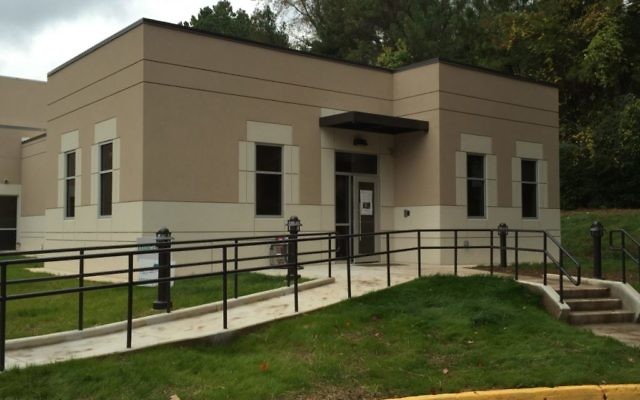Mikvah Opening Ceremony Nov. 15
By Logan C. Ritchie / lritchie@atljewishtimes.com
In Genesis 1:9, G-d commands, “Let the waters under the heavens be gathered into a single place.” Now the Jewish community has one place it can gather for a spiritual encounter with those waters.
The Metro Atlanta Community Mikvah, known as MACoM, is opening with a ribbon-cutting ceremony Sunday, Nov. 15, in Sandy Springs, providing a place for Jews to heal, connect and perform ritual immersion.
The new facility, on the grounds of Congregation B’nai Torah, is the brainchild of Rabbi Joshua Heller of B’nai Torah and Rabbi Alvin Sugarman of The Temple.
B’nai Torah housed a mikvah for years, but it was outdated and no longer served the community. When the synagogue started a renovation, leaders decided it was time to spin off the mikvah.
MACoM and B’nai Torah are now separate institutions, but the Conservative congregation is one of more than a dozen synagogues and other institutions that are partners in the mikvah.
MACoM was built and is maintained according to strict halachic standards. It was planned by a top mikvah expert, Rabbi Yaacov Love of Yeshivat Chovevei Torah in New York.
The mikvah broke ground in May and kicked off an intense fundraising campaign. The cost of construction is approximately $750,000. Funding has come from the Jewish Federation of Greater Atlanta, the Marcus Foundation, Georgia Aquarium CEO Mike Leven and his family, the mikvah partners, and private donors.
MACoM wants to raise an additional $200,000.
Executive Director Abby Horowitz said MACoM — Hebrew for “place” as well as an acronym — is where all streams of the Jewish community can gather.
“It is rare to have a ritual space shared by all Jews,” she said.
The mikvah offers immersion for rituals, including conversion to Judaism, and for contemporary reasons, such as recovery from illness.
“We see it as expanding ritual. Suddenly the mikvah may seem like a viable and attractive option, particularly for those who were incongruous” with strict Jewish law,” Horowitz said.
Anita Diamant, author of “The Red Tent” and founding president of Mayyim Hayyim: Living Waters, a community mikvah in suburban Boston, visited MACoM in February to promote and consult on the project.
In return, Horowitz flew to Boston in August. “It reaffirmed that not only is this idea possible, it is possible to be amazing. It impressed us how great an impact it had in Boston,” Horowitz said. “We could envision how to progress several years down the road. Our vision was affirmed.”
Like a big sister, Mayyim Hayyim helped MACoM leaders plan the number of towels to purchase and how long each immersion should last.
Tracie Bernstein of Congregation Gesher L’Torah in Alpharetta trained MACoM’s 18 volunteer guides — men and women.
Horowitz stressed the mikvah’s open arms. Handicap-accessible entrances to all rooms and a hydraulic lift assist the physically challenged. The LGBTQ community and same-sex couples are welcome.
“Historically, this ritual was more prevalent in a certain segment of the Jewish community, but we are opening the door to all community members for access to ritual,” she said.
“One cannot make the mikvah unkosher by who immerses or the way you immerse. If it’s a nontraditional reason or nontraditional person going in, you cannot contaminate the mikvah. This is not widely known in more Orthodox circles. The only way to mess up the mikvah is through the water and pipes that feed the pool,” Horowitz said.
Rabbis involved in the project have been proactive about making contact with the Orthodox community, though certain people will never visit the facility, Horowitz said. “We are building the mikvah for everyone and want to make the message clear: We have faith and hope that this will be a true community resource.”
What: MACoM ribbon cutting
Where: The grounds of Congregation B’nai Torah, 700 Mount Vernon Highway, Sandy Springs
When: 1 p.m. Sunday, Nov. 15
Cost: Free; www.atlantamikvah.org
Taking a Dip
Here are a few basics about MACoM.
Who may go to the mikvah?
Any Jew, regardless of gender identity or age, may visit MACoM.
Why visit the mikvah?
Jews are commanded to immerse in three ways, called Niddah:
- At the end of a woman’s menstrual cycle, she immerses; she then may reunite with her partner.
- The mikvah immersion is the final act in converting to Judaism.
- A bride immerses in preparation for her wedding.
May I visit the mikvah for other reasons?
Absolutely, Executive Director Abby Horowitz said. “It is customary in some communities to go before Shabbat or certain holidays. Women in their ninth month of pregnancy also like to visit.” Contemporary occasions, such as becoming a bar or bat mitzvah, and nonreligious events, such as turning 40, ending a relationship or dealing with an illness, are reasons to immerse. The mikvah provides a way for people to put life experiences in a Jewish context.
What if I’m not very religious?
MACoM welcomes all Jews, regardless of religiosity. For some, the visit is spiritual; for some, it fulfills a custom. Your mikvah guide will help shape your experience and carry out your wishes.
What does it cost?
The suggested donation varies, depending on the reason for your visit. A monthly pass is $36. Other life events are priced between $72 and $180. But cost should not stop your visit, Horowitz said.
CUTLINES
ABBY
MACoM Executive Director Abby Horowitz
EXTERIOR
The community mikvah has taken shape over six months of construction.
INTERIOR2
Immersion in the mikvah is open to any Jew for any reason.






comments